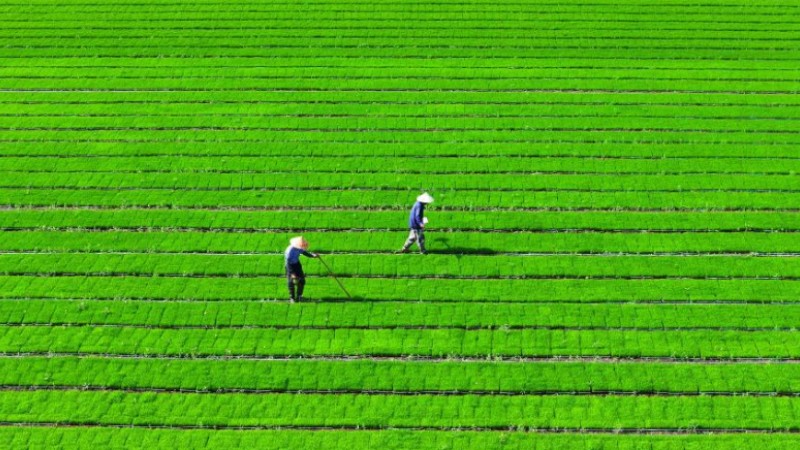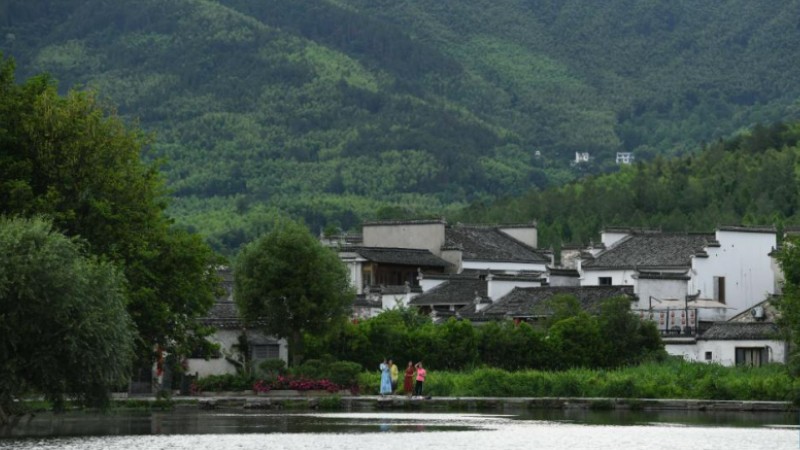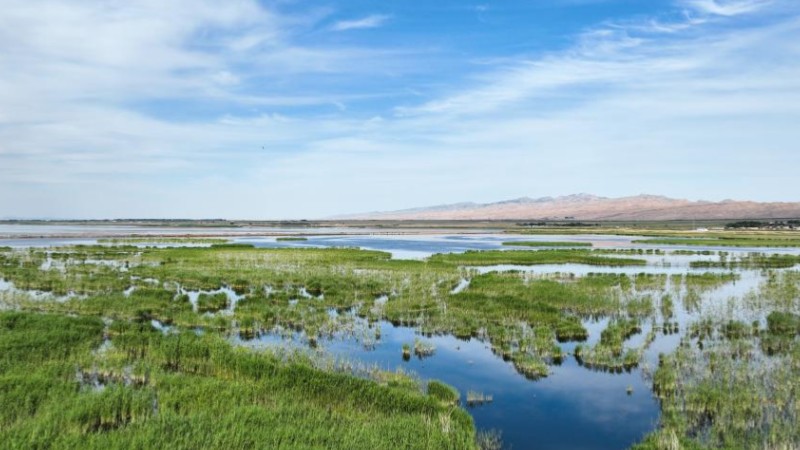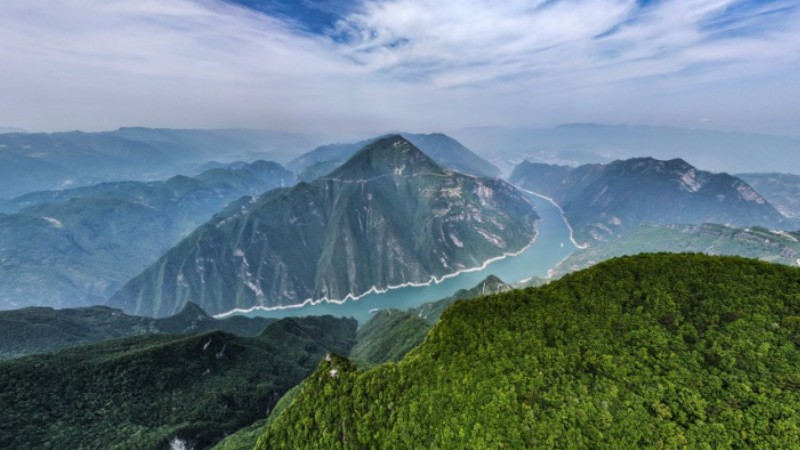Xi calls for sustained efforts to create new miracles in combating desertification
BAYANNUR, Inner Mongolia, June 7 (Xinhua) -- Xi Jinping, general secretary of the Communist Party of China (CPC) Central Committee, Chinese president and chairman of the Central Military Commission, presided over a symposium on strengthening comprehensive prevention and control of desertification and promoting the construction of key ecological projects, including the Three-North Shelterbelt Forest Program (TSFP), during an inspection tour in the city of Bayannur, north China's Inner Mongolia Autonomous Region, and made an important speech.
He stressed that to strengthen comprehensive prevention and control of desertification and further carry out the construction of such key ecological projects as the TSFP is of great concern to our country's ecological security, the building of a great country, and the sustainable development of the Chinese nation. It is a great accomplishment at present time that will benefit future generations. He required those involved to shoulder the mission with courage, determination and perseverance to create new miracles in China's fight against desertification in the new era, consolidate the green barrier that extends thousands of kilometers in the north of our motherland, and make greater achievements in building a beautiful China.
From Monday to Tuesday, accompanied by Sun Shaocheng, secretary of Party committee of Inner Mongolia Autonomous Region, and Wang Lixia, the autonomous region's chairwoman, Xi was on a fact-finding mission to a nature reserve, a modern agricultural demonstration park, a forest farm and a water resources department in Bayannur.
Located at the apex of the meandering bends of the Yellow River, Ulan Suhai Lake, also known as Wuliangsu Lake, is the biggest lake wetland of the Yellow River basin. With important functions of regulating water flow, improving water quality and preventing ice formation and flooding, it is a hub of ecological functions in north China, and a natural ecological barrier to prevent sandstorms from reaching Beijing and Tianjin. On Monday afternoon, Xi arrived at Ulan Suhai Lake to learn about the integrated protection and systematic management of mountains, rivers, forests, farmlands, lakes, grass and sand and the ecological environment rehabilitation there, and examine the natural landscape of the lake and the ecological environment in the surroundings. Xi stressed the great importance of environmental protection and rehabilitation work on Ulan Suhai Lake to the ecological security of north China. With task of environmental protection and rehabilitation clearly defined, wholehearted and meticulous efforts must be made in a consistent and long-term manner, so as to conserve well the lake as "a pearl beyond the Great Wall" and leave a beautiful homeland with lush mountains, lucid waters and clean air for future generations.
Xi then went to the modern agricultural demonstration zone at the southern bank of the lake. He watched exhibited samples of soil and seeds, and affirmed how local people have restored, transformed and made comprehensive utilization of saline-alkali and sandy lands, expanded well-planned irrigation, and promoted modern agriculture. Xi walked into the farmland, checked the growth of wheat and peppers, and asked the agricultural technicians on-site about the building of high-standard farmlands. He noted that the demonstration zone should play its role in promoting modern agriculture, keep exploration to find crop species, develop agricultural techniques and ways of farming in line with local conditions, and cut costs while enhancing output to develop modes that could be duplicated and popularized. The Hetao region enjoys natural advantages from irrigation of the Yellow River. Although water is not a problem, the region should still save water resources, boost highly-efficient modern agriculture and water-saving industries instead of making flood irrigation. Overall, grasslands have been overgrazed in Inner Mongolia, and something needs to be done for grasslands to rehabilitate.
Xi then went to state-owned Xinhua forest farm in Linhe District on Tuesday morning, where he learned about the development of the TSFP, an afforestation project covering north, northeast and northwest China. Since 1978, the forest farm has been making great efforts in rehabilitating sandy lands caused by saline-alkaline farmlands, and planted a total of 39,000 mu (2,600 hectares) of new forests. At the forest farm, Xi was briefed on the progress of the program in Inner Mongolia as well as sand control and afforestation of the farm, and checked sandy lands under restoration on the spot. Xi stressed that should the mankind live a better life and enjoy sound development, they must do a good work in combating desertification. Just like rolling a large rock uphill, endeavor in this regard is a progress that may fall into relapse if any negligence occurs. Major ecological projects like the TSFP could only be accomplished under the leadership of the CPC. Given the fragile ecological conditions of the Three North region, tackling desertification has become a long-term task of historic importance, and sustained efforts must be made in this regard to conserve well what our ancestors have left us and not to do a disservice to our future generations when it comes to ecology. The work at the forest farm is arduous, but remarkable outcomes have been achieved, and sustained efforts are needed for new progress. Scientific workers should base their research on the realities of our country, turn the real knowledge acquired from practice into their theses, and become the true PhDs and experts that the Party and the people need.
Xi then arrived at the Hetao Irrigation Area Water Information Monitoring Center for inspection. As one of the three mega irrigation areas in China, the Hetao Irrigation Area has formed a complete seven-tiered irrigation and drainage system. While watching the sand table and screens, Xi listened to an introduction about how the locals make use of information technologies to improve the precision management of the Hetao Irrigation Area and promote the eco-friendly and efficient use of water resources. He stressed that the irrigation project at the Hetao Irrigation Area is a great enterprise to the future of our country, and lots of endeavors have been made on it, which is worthwhile. More progress should be made in improving the scientific diversion and management of water. Meanwhile, all resources must be used within your means, a diverse input mechanism should be established to pool the strength of the whole society, Xi said.
On Tuesday afternoon, Xi chaired a symposium in Bayannur City on strengthening the overall prevention and control of desertification and accelerating the building of the TSFP and other key ecological projects. Those who made presentations include Wang Guanghua, minister of natural resources, Sun Shaocheng, secretary of the Party committee of Inner Mongolia Autonomous Region, Hu Changsheng, secretary of the Party committee of Gansu Province, and Liang Yanshun, secretary of the Party committee of Ningxia Hui Autonomous Region. He Lifeng, vice premier of the State Council and leaders of other relevant provinces and autonomous regions submitted written speeches.
Xi made an important speech after listening to the presentations. He stressed that the CPC Central Committee has attached great importance to the work of desertification prevention and control, and has made the prevention of desert encroachment and sand control major tasks in this regard. A series of key ecological programs have been launched, including the TSFP, the program of turning more marginal farmland into forests and grasslands, and source control of sandstorms in Beijing and Tianjin. With over 40 years of unremitting efforts, China has made remarkable achievements in desertification prevention and control. China realized a historical transformation from "sand forcing humans to retreat" to "trees forcing sand to retreat" in key areas under control, environmental protection and improving people's well-being have entered a virtuous circle, and economic and social development as well as the ecological environment of the regions with desertification saw tremendous changes. The areas of land desertification and soil desertification were both reduced, and hazards of sandstorms and soil erosion were effectively curbed. Laws and regulations in this regard have been improved, green development has benefited people's lives, and "the spirit of Three-North" has been cultivated. What China has achieved in this regard has become a model in ecological conservation in the world. Facts have proved that the decisions of the CPC Central Committee to prevent and control desertification was right and far-sighted, especially with the implementation of the projects such as the TSFP. China has blazed a special path of desertification prevention and control that follows the rules of nature and suits China's national reality and local conditions.
Xi pointed out that desertification is a major global environmental scourge that matters to human survival and development. China is one of the countries with the severest desertification, and desertification areas are mainly in northwest, north and northeast China. Xi noted that the regions with desertification problems often overlap areas that are economically underdeveloped and areas where ethnic minorities live in clusters. Disasters of the ecological system caused by desertification, hazards of sandstorms and soil erosion have constrained economic and social development in northwest, north and northeast China, and posed challenges to the survival and development of the Chinese nation. Currently, the control of desertification and sandification in China shows a positive trend of overall and accelerated improvement. However, the desert areas remain large, widely distributed, and the degree of desertification is severe, and difficult to control. Affected by abnormal weather conditions because of climate change, sandstorms have hit north China more frequently in the past two years. Reality shows that the task to combat desertification in our country remains severe. We need to fully recognize that sand control is a long-term and arduous task that may require repeated efforts for uncertain outcomes. We also need to be better positioned, and strengthen our sense of mission and urgency.
Xi stressed that the sixth phase of the TSFP will be constructed from 2021 to 2030, which is also a critical period for consolidating and building on the achievements in sand control, as well as driving the high-quality development of the program. It is important to fully and accurately implement the new development philosophy on all fronts, adhere to holistic conservation and systematic governance of mountains, rivers, forests, farmlands, lakes, grasslands and deserts, with sand control as focus and strengthening the eco-security shields in the northern region as fundamental goal. It is necessary to adopt targeted measures according to local conditions and the degree of damage, implement classified strategies, enhance overall planning and coordination, highlight key areas for control, and mobilize all parties involved. We must strive to complete the program in about 10 years, making it a fully functional and unbreakable Great Green Wall and eco-security shields in northern areas.
Xi pointed out that it is essential to adhere to a systematic approach and make solid progress in integrated conservation and systematic governance of mountains, rivers, forests, farmlands, lakes, grasslands and deserts. It is imperative to coordinate the conservation and restoration of forests, grasslands, wetlands and deserts, strengthen the coordination and management of all elements involved in sand control, river management and mountain conservation, and focus on cultivating healthy, stable and fully functional ecosystems in forests, grasslands, wetlands and deserts. It's imperative to strengthen joint prevention and control between different regions, break the limits of administrative management, and make coordinated conservation plans for both border areas and heartlands of deserts, both the windward and downwind sides, and both desert areas and routes, so as to build an ecological protection network that integrates points, lines and surfaces. It is essential to optimize the structure of utilizing lands for the agricultural, forestry and animal husbandry sectors, and strictly regulate the use of territorial space to leave enough ecological space and well protect the invaluable grasslands and forests.
Xi stressed that it's imperative to focus on key priorities in ecological conservation and spare no efforts to win the fight against air, water and land pollution. We should do our utmost to protect the ecosystem in the areas near the meandering bends of the Yellow River, with major focuses on regions including the Mu Us Desert, the Kubuqi Desert and the Helan Mountains. We should implement regional conservation projects in a comprehensive and systematic approach, and speed up controlling the lands affected by sandification. We should also protect and rehabilitate the rivers, lakes, wetlands and natural grasslands in the Hetao Plain and boost its capacity of preventing and controlling desertification and conserving water resources. It's imperative to go all out and pool strengths to fight against desertification in the two sandy lands of Horqin and Hunshandake, and arrange major ecological conservation and restoration projects in a sound manner. We should also do our best to prevent desertification in the Hexi Corridor-Taklimakan Desert region, do a good job in enclosing the hills to protect natural forests, grasslands and other vegetation in areas such as the Qilian Mountains, the Tianshan Mountains, the Altay Mountains, the Helan Mountains and the Liupan Mountains, and speed up rehabilitating the degraded forests and grasslands so as to ensure that deserts will never expand.
Xi noted that it's imperative to control deserts in a sound manner and improve the quality and stability of desert ecological systems on all fronts. It is imperative to regard the availability of water resources as the most rigid restraint and always take it into consideration for green development, land use, population growth and industrial development. It is essential to make great efforts to develop water-saving forests and grasslands. It is necessary to scientifically select vegetation restoration models, allocate forest and grass vegetation types and densities in a rational manner, adhere to the combination of trees, shrubs, and grasses, and create windbreak and sand-fixing forest networks, forest belts, and desert-edge forest and grass belts. It is imperative to adopt suitable measures based on local conditions and scientifically promote the application of effective governance models.
Xi called for efforts to extensively carry out international exchanges and cooperation, fulfill the United Nations Convention to Combat Desertification, actively participate in global desertification control and environmental governance, place strong emphasis on cooperation with neighboring countries, support desertification control and prevention efforts in Belt and Road countries, lead countries in policy dialogues and information sharing, and jointly respond to sand and dust storm disasters.
Xi emphasized that the implementation of the TSFP is a major national strategy. It is necessary to comprehensively strengthen organizational leadership and adhere to a working mechanism under which the central authorities coordinate, provinces take overall responsibility, and cities and counties ensure implementation. Policies and mechanisms should be improved, coordination and cooperation strengthened, and key related work should be guided, coordinated, and promoted in a unified manner. Efforts must be made to improve financial support and policy framework for the TSFP and to establish a stable and sustainable investment mechanism. Party committees and governments at all levels should maintain strategic resolve, stick to a single blueprint until the end, do hard work one term after another, and make unremitting efforts to advance the construction of key projects such as the TSFP in order to build a strong ecological security barrier in north China.
Cai Qi, a member of the Standing Committee of the Political Bureau of the CPC Central Committee and director of the General Office of the CPC Central Committee, accompanied Xi on the inspection tour and attended the symposium.
Li Ganjie and others were on the inspection tour and attended the symposium. He Lifeng was also on the inspection tour. Ma Xingrui and the leading officials of the relevant central Party and government departments, leading officials of relevant provinces and autonomous regions attended the symposium.
Photos
Related Stories
- Xi calls for more efforts to shoulder new cultural mission in congratulatory letter to forum on building up nation's cultural strength
- Xi: Advance prosperity of Chinese culture
- Building "green Great Wall" with integrated ecological efforts
- Xi stresses cultural advancement in letter to forum
- Xi's Quotes|One can only make progress when he thinks big, and move forward when he looks far
Copyright © 2023 People's Daily Online. All Rights Reserved.









